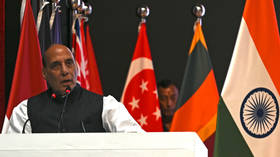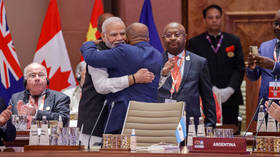India calls for ‘inclusive and rules-based’ Indo-Pacific

Indian military officials on Tuesday reiterated New Delhi’s call for a “free, open, inclusive and rules-based” Indo-Pacific region, as the nation hosts a set of military conferences amid a diplomatic crisis with Canada.
Indian Defense Minister Rajnath Singh, speaking at the Indo-Pacific Armies Chiefs Conference (IPACC) in New Delhi on Tuesday, said India’s efforts towards building robust military partnerships underscore its commitment to not only safeguard its national interests but also address the global challenges faced by all.
“India has always stood for a free, open, inclusive and rules-based Indo-Pacific Region, in the pursuit of shared security and prosperity,” Singh said, according to a statement released by the Ministry of Defense. He noted that India’s approach to the region is defined by its Act East policy, which promotes economic cooperation, cultural ties, and strategic relationships with the nations of Southeast Asia.
The 13th IPACC conference, along with the Indo-Pacific Armies Management Seminar (IPAMS) and the Senior Enlisted Leaders Forum (SELF), which Singh called “one of the largest brainstorming events of land forces in the region,” are co-hosted by the armies of India and the US and attended by delegates from 35 countries.
Indian Army chief General Manoj Pande also called for a free and stable Indo-Pacific, where the “sovereignty and territorial integrity of all nations is respected.” India’s outlook for the region emphasizes respect for sovereignty and the territorial integrity of all nations, Pande said. His remarks come amid growing concerns in New Delhi over China’s military presence in the region, PTI news agency reported.
Some of New Delhi’s key partners in the Indo-Pacific region, including the US and Australia, played a crucial role in the standoff with Ottawa over its allegations regarding India’s “potential” involvement in the killing of a Sikh leader in Canada. New Delhi has denied the claims, accusing Ottawa of being a “safe haven” for terrorists. Canada has yet to provide any public evidence to support Prime Minister Justin Trudeau’s allegations.
When asked about the diplomatic stand-off between India and Canada, the deputy commander of the Canadian Army, Major General Peter Scott, told the media on the sidelines of the conference that despite the allegations, the armies of the two nations are looking for opportunities to “exchange ideas” and “learn from each other.”
The US Army’s chief of staff, General Randy George, said the partnership between the Indian and US armies “is very important for stability in the Indo-Pacific,” adding that the relationship between the two is “strong and growing stronger.”
According to the definition of the Indian Foreign Ministry, the Indo-Pacific encompasses several regions and subregions of the South Pacific, including Australia, New Zealand, the Pacific island states, the East China Sea, ASEAN countries, the waters around the Indian subcontinent, including the Andaman Sea, the Bay of Bengal, the Arabian Sea, the Western Indian Ocean, and the African littorals and islands.













